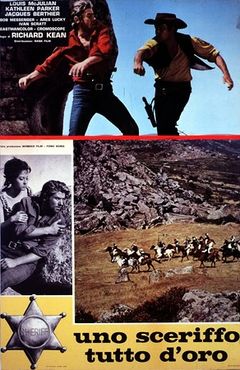A Golden Sheriff Review (Scherpschutter)
UNDER CONSTRUCTION

|
A Golden sheriff (Uno Sceriffo tutto d'oro)
The first spaghetti western by Osvaldo Civirani, a jack of all trades turned director. He had started within the business as a photographer of screen shots, used for publicity material by the major studios. As such he had worked with the greatest directors and the greatest stars, and eventually he would make a fortune by collecting his best and most revealing pictures in a couple of books with alluring titles such as Un Fototagafo a cinecittà, tra negativi positivi e belle donne (1), but in 1967 he was - like most people in the business - dreaming of making a western.
The lyrics of the ballad sung by Don Powell over the opening credits, tell us that gold will change a man, and that's very much the story of this movie: it's about gold ("that little stone that glows on the sand") and the effect it has on people, including Jeff Randall, the newly appointed sheriff of Blackstone. Jeff has found out that being a sheriff is a rather ungrateful job and dreams of stealing a stash of gold bars worth $ 500,000 that will be transported through his jurisdiction. He saves a convicted thief and blackmailer called Arizona Roy from the gallows (under a false pretext) and works out an intricate plan to rob the stagecoach in which the gold is hidden. The plan succeeds, but on their way to Mexico the two men are duped by Jane, the cunning and manipulative young woman of an innkeeper. On her turn, Jane soon loses the gold to a gang of Mexican outlaws, led by the bloodthirsty Vargas. In order to get the gold back, the three will have to collaborate ...
A Golden Sheriff is a better movie than Civiriani's better-known The Son of Django, but I was a bit surprised by the positive reactions it had generated on the forum. The film has its moments, but not too many; the best scene is the opening scene, Jeff Randall arriving in town in the style of Julius Caesar - Vini Vidi Vici - having a violent encounter with the scum that has killed his predecessor. The scene also features Luciano Rossi, apart from a couple of regulars in supporting roles the only familiar face in the entire movie. Originally Klaus Kinski was supposed to star in it, but he demanded absolute control over all of his scenes (and probably also too much money).
With its changing alliances, double-crossings, and the three protagonists vying for a gold treasure (but eventually working together against a common enemy) the story is reminiscent of the caper movies Castellari made around this time, such as Vado l'ammazzo e torno and sette winchester per un massacro. It's quite lively, but the grim humor of The Good the Bad and the Ugly (the model for all these caper movies) that also marked Castellari's movies, is less prominent here, for most part virtually absent, only surfacing in the film's light-hearted finale. All of a sudden there's an about face, apparently because Civiriani wanted to redeem his protagonist, sheriff Randall. The scene feels like a coda of the type 'all's well that ends well' and most have called it a major let-down, but some have defended it; in an interesting comment on the Italian blog CineMaestri, it is compared to the similarly redemptive finale of John Ford's Stagecoach.
Most outdoor scenes for the movie were shot on Sardinia and (along with the cast of unknowns) give the film a distinctive look. French actor Berthier had appeared in the rather obscure Colorado Charlie and would make one more (brief) spaghetti western appearance, in Corbucci's Bianco, il giallo, il nero, Il; according to the French spaghetti western forum, he was very active in the dubbing business. If you like Don Powell, you'll like the theme song, if you don't like him, you'll hate it. Nora Orlandi's score is very fine, with a particularly affectionate whistled theme halfway the movie, but parts of the score sounded suspiciously familiar.



